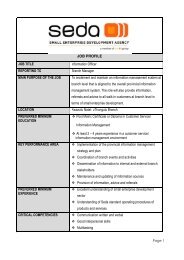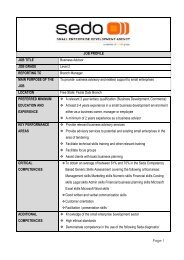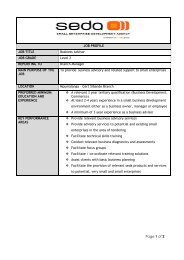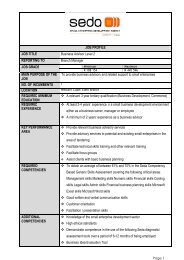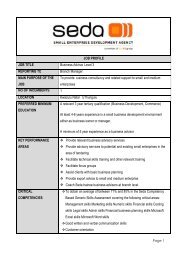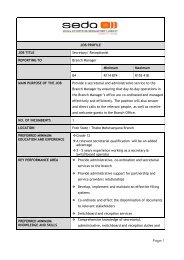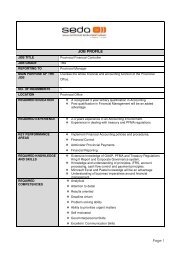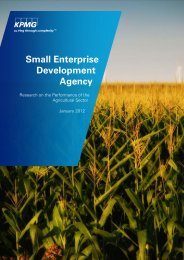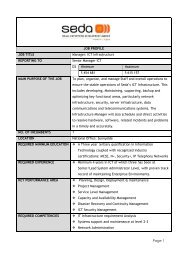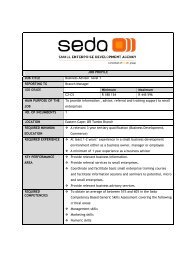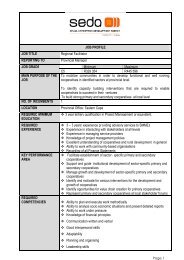Assessment of Cooperatives in the Poultry Industry - 2013.pdf - Seda
Assessment of Cooperatives in the Poultry Industry - 2013.pdf - Seda
Assessment of Cooperatives in the Poultry Industry - 2013.pdf - Seda
You also want an ePaper? Increase the reach of your titles
YUMPU automatically turns print PDFs into web optimized ePapers that Google loves.
Research Report: Address<strong>in</strong>g <strong>the</strong> Needs, Opportunities and Challenges <strong>of</strong> <strong>Cooperatives</strong><br />
and Collectively Owned Enterprises <strong>in</strong> <strong>the</strong> <strong>Poultry</strong> and Related Industries<br />
The decision on pr<strong>of</strong>it shar<strong>in</strong>g may be made for any <strong>of</strong> a number <strong>of</strong> reasons. When cooperatives<br />
were asked how <strong>the</strong>y decide what to do with <strong>the</strong>ir pr<strong>of</strong>its, most provided a response which <strong>in</strong>dicated<br />
that <strong>the</strong>re is no standard <strong>in</strong> place and very little thought around <strong>the</strong> process. Most gave answers<br />
which were not concerned with <strong>the</strong> decision mak<strong>in</strong>g process, but ra<strong>the</strong>r a statement <strong>of</strong> what <strong>the</strong>y<br />
have always done and thus cont<strong>in</strong>ue to do. For example, when asked how <strong>the</strong>y decide on pr<strong>of</strong>it<br />
shar<strong>in</strong>g, cooperatives answered that pr<strong>of</strong>its are divided annually, that money is always shared<br />
monthly as salaries, or that <strong>the</strong> money is re<strong>in</strong>vested <strong>in</strong>to <strong>the</strong> bus<strong>in</strong>ess. Less than 20% <strong>of</strong> respondents<br />
<strong>in</strong>dicated a deductive process <strong>in</strong> th<strong>in</strong>k<strong>in</strong>g about pr<strong>of</strong>its; <strong>the</strong>y responded that decisions regard<strong>in</strong>g<br />
around pr<strong>of</strong>its are made differently depend<strong>in</strong>g on <strong>the</strong> amount <strong>of</strong> pr<strong>of</strong>it earned by <strong>the</strong> cooperative.<br />
When asked aga<strong>in</strong> whe<strong>the</strong>r any pr<strong>of</strong>its were re<strong>in</strong>vested <strong>in</strong>to <strong>the</strong><br />
bus<strong>in</strong>ess, 58% <strong>of</strong> cooperatives stated that money was re<strong>in</strong>vested<br />
<strong>in</strong>to <strong>the</strong> cooperative. However, <strong>in</strong> <strong>the</strong> question above only 45%<br />
stated that money was re<strong>in</strong>vested (or saved, which is ano<strong>the</strong>r<br />
form <strong>of</strong> re<strong>in</strong>vestment). This discrepancy may be representative<br />
<strong>of</strong> a lack <strong>of</strong> understand<strong>in</strong>g <strong>of</strong> <strong>the</strong> f<strong>in</strong>ancial situation <strong>of</strong> <strong>the</strong>ir<br />
cooperative. Ask<strong>in</strong>g what is done with pr<strong>of</strong>its is an open ended<br />
question and allowed cooperatives to provide an honest answer.<br />
Less than 20% <strong>of</strong><br />
respondents<br />
<strong>in</strong>dicated a<br />
deductive process<br />
<strong>in</strong> th<strong>in</strong>k<strong>in</strong>g about<br />
pr<strong>of</strong>its<br />
When asked whe<strong>the</strong>r any money is re<strong>in</strong>vested, cooperatives know that <strong>the</strong>y should re<strong>in</strong>vest money<br />
and thus say “yes”, even if it is not entirely true. Many cooperatives have received government<br />
support <strong>in</strong> <strong>the</strong> past and thus when surveys are conducted <strong>the</strong>y are likely to respond to certa<strong>in</strong><br />
questions <strong>in</strong> a way <strong>in</strong> which <strong>the</strong>y th<strong>in</strong>k government departments would like to hear.<br />
The greatest challenges that cooperatives highlighted <strong>in</strong> manag<strong>in</strong>g <strong>the</strong>ir f<strong>in</strong>ances are limited <strong>in</strong>come<br />
and a lack <strong>of</strong> tra<strong>in</strong><strong>in</strong>g <strong>in</strong> f<strong>in</strong>ancial management. The figure (4-11) below shows <strong>the</strong> percentage <strong>of</strong><br />
responses concern<strong>in</strong>g various challenges <strong>in</strong> f<strong>in</strong>ancial management.<br />
Figure 4-11: Challenges <strong>in</strong> F<strong>in</strong>ancial Management<br />
Limited <strong>in</strong>come<br />
39%<br />
Lack<strong>in</strong>g tra<strong>in</strong><strong>in</strong>g on f<strong>in</strong>ancial management<br />
32%<br />
Inconsistent cash flow<br />
11%<br />
No f<strong>in</strong>ancial management system<br />
7%<br />
O<strong>the</strong>r<br />
11%<br />
0% 5% 10% 15% 20% 25% 30% 35% 40% 45%<br />
Source: Urban-Econ Survey, 2013<br />
51 | P a g e U r b a n - E c o n : D e v e l o p m e n t E c o n o m i s t s



